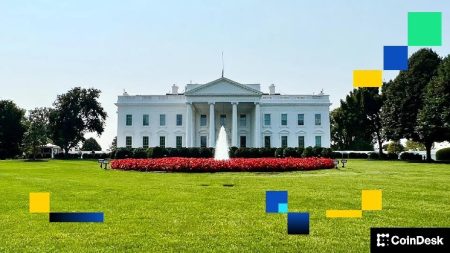Navigating the Regulatory Maze: Can DeFi Projects Achieve Compliance While Staying True to Decentralization?
The Growing Tension Between Innovation and Regulation in Decentralized Finance
In the rapidly evolving landscape of financial technology, few areas have sparked as much debate as the intersection of decentralized finance (DeFi) and regulatory compliance. During last week’s D.C. Fintech Week in Washington, industry experts gathered to tackle a seemingly paradoxical question: Can truly decentralized financial systems comply with traditional regulatory frameworks without compromising their fundamental nature? This question has become increasingly urgent as regulatory scrutiny intensifies across global markets, creating a complex landscape for developers and users alike.
The panel discussion, moderated by industry analyst Nikhilesh De, brought together diverse perspectives from Maha El Dimachki, head of the BIS Innovation Hub’s Singapore Centre; Yaya Fanusie, global head of Policy at Aleo; and Lee Schneider, general counsel at Ava Labs. Their conversation delved into the heart of a critical question facing the blockchain industry today: Where does responsibility lie when decentralized protocols are used for illicit purposes, and what obligations do developers have in preventing such activities?
The Developer Liability Dilemma: Precedent-Setting Cases Reshape the Landscape
The liability of developers for how their projects are utilized has moved beyond theoretical discussions into courtrooms worldwide. High-profile cases against Tornado Cash developers Roman Storm and Alexey Pertsev have sent ripples through the industry, raising fundamental questions about the boundaries of developer responsibility. These cases represent more than individual legal challenges; they signal a pivotal moment in defining the relationship between innovation and accountability in the blockchain space.
“We’re witnessing the creation of legal precedent in real-time,” noted one participant in the discussion. “The outcome of these cases will likely shape development practices for years to come.” This evolving legal landscape has created significant uncertainty for developers who find themselves navigating between two core principles: creating truly permissionless systems and implementing safeguards against misuse. The tension emerges from competing visions of DeFi’s future – one where code operates without interference and another where certain guard rails ensure protection against harmful activities.
Reframing Compliance: From Contradiction to Risk Management
What initially appears as an inherent contradiction – compliant decentralized finance – may actually represent a more nuanced reality, according to the panel experts. Rather than viewing compliance as binary, the speakers advocated for a more sophisticated understanding of developer responsibilities, with Fanusie specifically reframing the issue as one of “risk management.” This perspective shifts the focus from rigid compliance structures to identifying and mitigating potential vulnerabilities that could expose projects to regulatory challenges or enable exploitation by malicious actors.
“The question isn’t whether developers should implement compliance measures, but rather what form those measures should take in decentralized environments,” explained Fanusie during the discussion. This nuanced approach recognizes that while developers may not control how individuals use their protocols, they can architect systems that discourage or complicate illicit usage. Schneider reinforced this view by highlighting the shared interest between regulators and developers in user protection, noting that preventing financial loss represents common ground between these seemingly opposed groups. El Dimachki contributed valuable regulatory insight, suggesting that “outcome-based policymaking” focused on preventing harmful activity could provide a more flexible framework for DeFi regulation than prescriptive rules designed for traditional financial systems.
The Global Compliance Challenge: Navigating Jurisdictional Complexities
Perhaps the most daunting aspect of DeFi compliance stems from its inherently borderless nature. Unlike traditional financial institutions that can tailor services to specific jurisdictions, decentralized protocols typically operate globally by design. This raises profound questions about how projects can navigate the complex and often contradictory regulatory requirements across different countries. The fundamental issue isn’t merely about willingness to comply but about the practical feasibility of meeting diverse regulatory expectations simultaneously.
“A protocol that perfectly satisfies European requirements might violate American ones, and vice versa,” one expert noted during the discussion. “We haven’t yet developed frameworks that adequately address the transnational nature of these technologies.” This jurisdictional complexity creates particularly challenging circumstances for projects committed to both decentralization and regulatory compliance. Some protocols have attempted to implement geo-fencing or other access restrictions, but these measures often undermine the core decentralization principles that attract users in the first place. Moreover, even with developer-implemented restrictions, the open-source nature of many DeFi projects means that determined actors can simply fork the code and create non-compliant versions. This technological reality raises profound questions about the limits of developer liability in an environment where their code can be repurposed without permission.
Finding Common Ground: Aligning Developer Innovation with Regulatory Objectives
Despite the apparent tensions, the panel revealed surprising areas of consensus between regulatory and development communities. Both sides increasingly recognize that protecting users from scams, exploits, and market manipulation serves everyone’s interests. This shared goal could potentially form the foundation for more collaborative approaches to DeFi governance that preserve innovation while addressing legitimate regulatory concerns. As El Dimachki observed during the panel, regulators are increasingly focusing on outcomes rather than specific technical implementations, potentially creating space for creative compliance solutions.
“The future likely lies in technologies that bake compliance into protocol design without requiring centralized gatekeepers,” suggested one participant. This perspective highlights emerging possibilities through zero-knowledge proofs, decentralized identity solutions, and other privacy-preserving verification methods that could satisfy regulatory requirements without compromising core DeFi principles. Several projects are already developing compliance-oriented tools that allow users to verify regulatory status without revealing sensitive information – potentially bridging the gap between privacy and accountability. These technological innovations suggest that the apparent contradiction between decentralization and compliance might eventually be resolved through creative engineering rather than regulatory compromise.
The Path Forward: Industry Self-Regulation and Collaborative Frameworks
As the DeFi sector matures, many developers and projects are recognizing the value of proactive engagement with regulatory questions rather than reactive responses to enforcement actions. Industry-led standards, self-regulatory organizations, and collaborative policy development could play crucial roles in establishing frameworks that protect innovation while addressing legitimate concerns about financial crime and consumer protection. The panel discussion revealed growing recognition that sustainable growth for DeFi likely requires finding balanced approaches that satisfy regulatory requirements without sacrificing the core benefits of decentralization.
“The most promising path forward involves developers, users, and regulators collaborating to establish principles that protect against genuine harms while preserving the transformative potential of decentralized systems,” concluded one participant. This collaborative approach acknowledges that neither absolute regulatory immunity nor complete regulatory capitulation serves the ecosystem’s long-term interests. As regulatory hearings continue in Washington this week, including the upcoming Senate Banking Committee session on “Rightsizing Regulation to Promote American Opportunity,” these conversations will undoubtedly shape the evolving relationship between DeFi innovation and regulatory oversight.
The question of whether truly compliant DeFi represents an achievable goal or a fundamental contradiction remains open. However, the thoughtful engagement displayed during D.C. Fintech Week suggests that industry participants are moving beyond simplistic positions toward more nuanced understandings of how decentralized systems can interact responsibly with regulatory frameworks. As one panelist aptly summarized: “The future of finance likely isn’t fully centralized or completely decentralized, but rather a carefully designed synthesis that preserves the benefits of both approaches while mitigating their respective weaknesses.”












